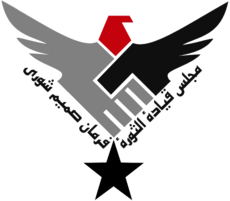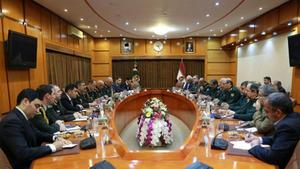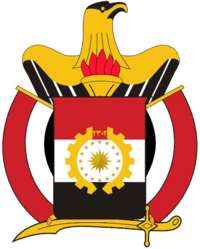Central Command Council: Difference between revisions
| Line 45: | Line 45: | ||
* Advise on and produce legislation via the Union Ministry of Justice to provide the legal foundations for the State Security Tribunals. | * Advise on and produce legislation via the Union Ministry of Justice to provide the legal foundations for the State Security Tribunals. | ||
=== Military === | === Military === | ||
* Ensure personnel readiness of armed forces | The military responsibilities of the Central Command Council is conducted through its subordinated body, the [[Revolutionary Military Command]]. The RMC's membership is identitcal to the CCC. The Revolutionary Military Command's duties and responsibilities are: | ||
* Formulate strategic and tactical policy | * Ensure personnel readiness of armed forces. | ||
* Improvement of the structure and organization of the armed forces | * Formulate strategic and tactical policy. | ||
* Development and introduction of training manuals, tactics, and methodology | * Improvement and modernisation of the structure and organization of the armed forces. | ||
* Development of military theory and practice | * Development and introduction of training manuals, tactics, and methodology for distribution to all branches. | ||
* Development of military theory and practice. | |||
* Advising the civil executive on security and military matters. | |||
== Subordinate organisations == | |||
The CCC maintains direct control and authority over a series of key national institutions, some of which hold significant sway over Zorasani society. These organisations are as follows: | |||
* [[General Intelligence Service (Zorasan)|General Intelligence Service]]: the {{wp|military intelligence}} service. Since 2008, the GIS has surpassed the [[Union Ministry of State Intelligence and Security]] as the primary domestic security service. It also manages Zorasan's {{wp|signals intelligence}} and {{wp|cyberwarfare}} service. | |||
* [[State Commission for Societal Defence]]: the SCSD is taksed with organising and managing the various patriotic grass-roots groups and organisations, the largest and most successful being the [[Wolves (organisation)|Wolves Organisation]]. The SCSD also serves as an {{wp|anti-corruption}} task force, the official state {{wp|censorship|censor}} and maintains the national telephone helpline for citizens to report "subversive behaviour." | |||
* [[Great Soldier Foundation]]: this is the {{wp|holding company}} for the military's various businesses and interests. It is the second largest holding company in northern Coius, with an estimated $239 billion in managed assets. | |||
* [[Bonyad Peŝvar Khosrow]]: this is the military's {{wp|bonyad}} dedicated to fundraising for veterans and providing financial support for those with life-altering injuries. The BPK is one of the largest providers of after-care, {{wp|physical rehabilitation}} training in the country. | |||
* [[Union Ordnance Factories Corporation]]: is Zorasan's second largest {{wp|arms industry|military contractor}} and producer of firearms, explosives and armoured vehicles. It is overseen directly by the CCC independently of the Great Soldier Foundation. | |||
== Membership == | == Membership == | ||
Revision as of 16:05, 26 December 2020
Central Command Council | |
|---|---|
 | |
| Type | |
| Type |
|
| Leadership | |
Chairman | Maj. Gen Alireza Fadavi since 18 June 2016 |
| Structure | |
| Seats | 17 |
Political groups | Military |
| Meeting place | |
 | |
| Zahedan, Pardaran UR, Zorasan | |
 |
|---|
| This article is part of a series on the politics and government of Zorasan |
The Central Command Council is the most senior military body in Zorasan, that serves as an executive council, legislative council, the country's national security council and the secondary federal Election supervision body. The Central Command Council is also endowed with significant powers and responsibilities. The CCC's influence and power over matters of government is such, that many commentators regard the body as the true political authority in Zorasan.
The CCC is comprised of 16 members drawn from all branches of the Zorasani Irfanic Revolutionary Army and is headed by the commander-in-chief of the armed forces. The CCC is charged by the 2008 constitution to, supervising elections of, and approving of candidates too, the Popular Assembly, Superior Assembly, municipal elections and state-level elections. The CCC is also charged with appointing the federal ministers for Foreign Affairs, Internal Affairs, National Defence and State Intelligence and Security. By virtue of these appointments, the military has the final say on foreign policy, internal law and order and state intelligence. In both chambers of the legislature, the CCC appoints two-thirds of the upper-house and 10% of members to the lower-house, with the former being mostly comprised of senior level commanders, who are granted seats for life.
In 2017, the powers of the CCC were expanded with the right to determine the annual military budget independently of the Ministry of Finance. This also supported by the denial of the civic government to replace military officers without the authorisation of the CCC. In 2018, this was further developed with the CCC being given sole authority to promote, dismiss and appointed military officers.
Powers and responsibilities
The Central Command Council is imbued with a wide range of powers and responsibilities by the 2008 Constitution, these cover areas relating to the national legislature, executive and judicial branches, while also enjoying significant influence over the country’s electoral system. These powers also stand alongside the exclusive organisational and administrative responsibilities for the Zorasani Irfanic Revolutionary Army, of which, the Central Command Council members also serve as the Revolutionary Central Command (chiefs of staff).
Under the 2008 constitution, which established the Civic-Military State, the CCC is mandated to
Political
- Appoint two-thirds (335) members of the Superior Assembly of the Union, this also includes the appointment of life term members, who are military officers at the rank of brigadier general and above. This also requires the maintenance and organisation of Zorasan Zindebad, the political grouping of military members in the upper house.
- Appoint the chairpersons of the Assembly Committees on Foreign Affairs, National Security, Defence and Law Enforcement, from members of the Popular Assembly of the Union.
- Confirm or reject the First Minister’s appointments for the Union Ministries of Foreign Affairs, Internal Affairs, National Defence and Justice.
- Produce and provide the annual defence budget for the Union Ministry of Finance following consultation with the UMF.
- Provide advice and the final policy confirmation for matters relating to foreign, security, defence and internal security.
- Appoint Special Representatives of the Central Command Council to each of the Union Republics of Zorasan, to observe state-executives and to report back to the Central Command Council.
- Appoint the Chair and Deputy Chairperson of the Union Electoral Commission. Through the UEC, the CCC is mandated to vet candidates for the federal legislature on the basis of “ideological moderation.”
Judicial
- Appoint the presiding judges of the State Security Tribunals.
- Advise on and produce legislation via the Union Ministry of Justice to provide the legal foundations for the State Security Tribunals.
Military
The military responsibilities of the Central Command Council is conducted through its subordinated body, the Revolutionary Military Command. The RMC's membership is identitcal to the CCC. The Revolutionary Military Command's duties and responsibilities are:
- Ensure personnel readiness of armed forces.
- Formulate strategic and tactical policy.
- Improvement and modernisation of the structure and organization of the armed forces.
- Development and introduction of training manuals, tactics, and methodology for distribution to all branches.
- Development of military theory and practice.
- Advising the civil executive on security and military matters.
Subordinate organisations
The CCC maintains direct control and authority over a series of key national institutions, some of which hold significant sway over Zorasani society. These organisations are as follows:
- General Intelligence Service: the military intelligence service. Since 2008, the GIS has surpassed the Union Ministry of State Intelligence and Security as the primary domestic security service. It also manages Zorasan's signals intelligence and cyberwarfare service.
- State Commission for Societal Defence: the SCSD is taksed with organising and managing the various patriotic grass-roots groups and organisations, the largest and most successful being the Wolves Organisation. The SCSD also serves as an anti-corruption task force, the official state censor and maintains the national telephone helpline for citizens to report "subversive behaviour."
- Great Soldier Foundation: this is the holding company for the military's various businesses and interests. It is the second largest holding company in northern Coius, with an estimated $239 billion in managed assets.
- Bonyad Peŝvar Khosrow: this is the military's bonyad dedicated to fundraising for veterans and providing financial support for those with life-altering injuries. The BPK is one of the largest providers of after-care, physical rehabilitation training in the country.
- Union Ordnance Factories Corporation: is Zorasan's second largest military contractor and producer of firearms, explosives and armoured vehicles. It is overseen directly by the CCC independently of the Great Soldier Foundation.
















